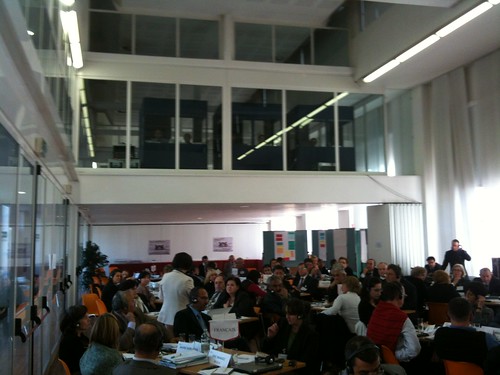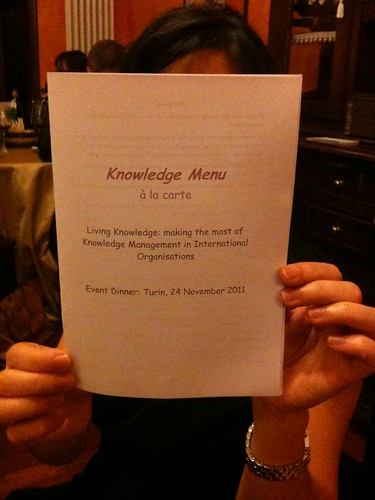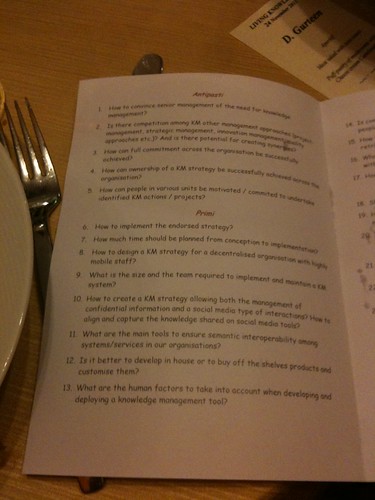
You can see the language banners on the tables and the three translation booths overlooking the room.
During my time there, I ran two knowledge cafes.
The first was part of a two day workshop for around 90 participants from ETF member countries where they discussed the role of evidence in "governance and effective Vocational Education and Training (VET) policies".
Member countries included Albania, Algeria, Armenia, Azerbaijan, Belarus, Bosnia And Herzegovina, Croatia, Egypt, Former Yugoslav Republic of Macedonia, Georgia, Israel, Jordan, Kazakhstan, Kyrgyzstan and Kosovo.
So quite an ethnic mix.
This was the more challenging of the two knowledge cafes given the large number of people and the fact that three languages were being spoken: English, French and Russian.
This meant that each table needed to be labelled with the language intended to be spoken at that table and when people changed tables they needed to move to a table where their language was spoken. My introduction to the KCafe and explanation of the process was simultaneously translated into French and Russian.
Then where as normal, I would have brought everyone together in a circle at the end of the KCafe, I simply asked for a few people to share with the rest of the group what they had learnt from their conversations. This was done by handing around a couple of stick mikes. Not the perfect way to run one of my KCafes but a reasonable adaptation in the circumstances.
Several people, found me after the event to say how much they enjoyed the KCafe and I was pleased that two of them told me they were already using the process in their own organisations
I even had a woman from Kazakhstan ask through an interpreter if I had a description of the KCafe process In Russian. I don't but it has prompted me to think about writing a short document that could be translated into multiple languages to explain the process. I may be asking for help on this at a later date :-)
And then on the second day I ran a Knowledge Cafe for a much smaller group (about 20) of KM managers. This was a more regular KCafe. What was interesting though was the meal the evening before.
Ian Cumming who had attended one of my Knowledge Cafe workshops in London a few weeks before had heard me talk about Theordore Zeldins conversation dinners. Inspired by this he had created a conversational menu for the evening. Not quite along Theodore's lines but interesting nevertheless. My first reaction was that no one would select a conversation from the menu as the questions were far too work related.
I was proven wrong in part. There were three tables in the dining room, each seating about 6 people. My table was the only one that drew some of our conversation from the menu (and that was not my doing).
What surprised me was how well it worked. Given it was a social evening, we did not stick too closely to the questions and there was a lot of laughter and banter but the conversation was to my mind interesting and valuable nevertheless.
If you get the opportunity try it.




